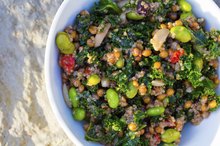What does fact checked mean?
At Healthfully, we strive to deliver objective content that is accurate and up-to-date. Our team periodically reviews articles in order to ensure content quality. The sources cited below consist of evidence from peer-reviewed journals, prominent medical organizations, academic associations, and government data.
The information contained on this site is for informational purposes only, and should not be used as a substitute for the advice of a professional health care provider. Please check with the appropriate physician regarding health questions and concerns. Although we strive to deliver accurate and up-to-date information, no guarantee to that effect is made.
Foods and Vitamins to Help Heal Nerve Endings
The nervous system is a critical part of the human body. It is responsible for transmitting messages to the brain about external stimuli, such as heat, cold and pain. A healthy nervous system may help prevent a variety of neurological diseases, such as Alzheimer's and Parkinson's disease. According to Dr. James Balch and Phyllis Balch, authors of "Prescription for Nutritional Healing," certain vitamins and foods may help heal nerve endings 1. Contact your doctor before adding vitamins or foods to heal nerve damage.
Vitamin B6
Vitamin B6, also known as pyrodoxine, is necessary for proper functioning of the nervous system, according to Dr. James and Phyllis Balch. This vitamin may also help protect and heal nerve endings in the skin, brain and other areas of the human body. Vitamin B6 is found in foods such as:
- carrots
- fish
- eggs
- spinach
- whole grain products
- sunflower seeds
Vitamin B12
Can Vitamins Prevent the Flu?
Learn More
According to the National Institutes of Health, vitamin B12 is essential for maintaining the health of the nervous system 2. This vitamin, also known as cobalamin, is thought to help prevent and correct nerve damage. Vitamin B12 is also necessary for the production of acetylcholine, which aids in transmission of information from the nerve endings to the brain.
Vitamin B1
Vitamin B1, also known as thiamine, is necessary for the metabolism of carbohydrates, formation of red blood cells and proper digestion. This vitamin is also needed for the repair of nerve damage and the protection of nerve endings from damage caused by free radical molecules and toxins, according to the Balches.
Related Articles
References
- "Prescription for Nutritional Healing"; James F. Balch, M.D. and Phyllis A. Balch, C.N.C.; 1997
- National Institutes of Health: Dietary Supplement Fact Sheet--Vitamin B12
Writer Bio
Owen Pearson is a freelance writer who began writing professionally in 2001, focusing on nutritional and health topics. After selling abstract art online for five years, Pearson published a nonfiction book detailing the process of building a successful online art business. Pearson obtained a bachelor's degree in art from the University of Rio Grande in 1997.









